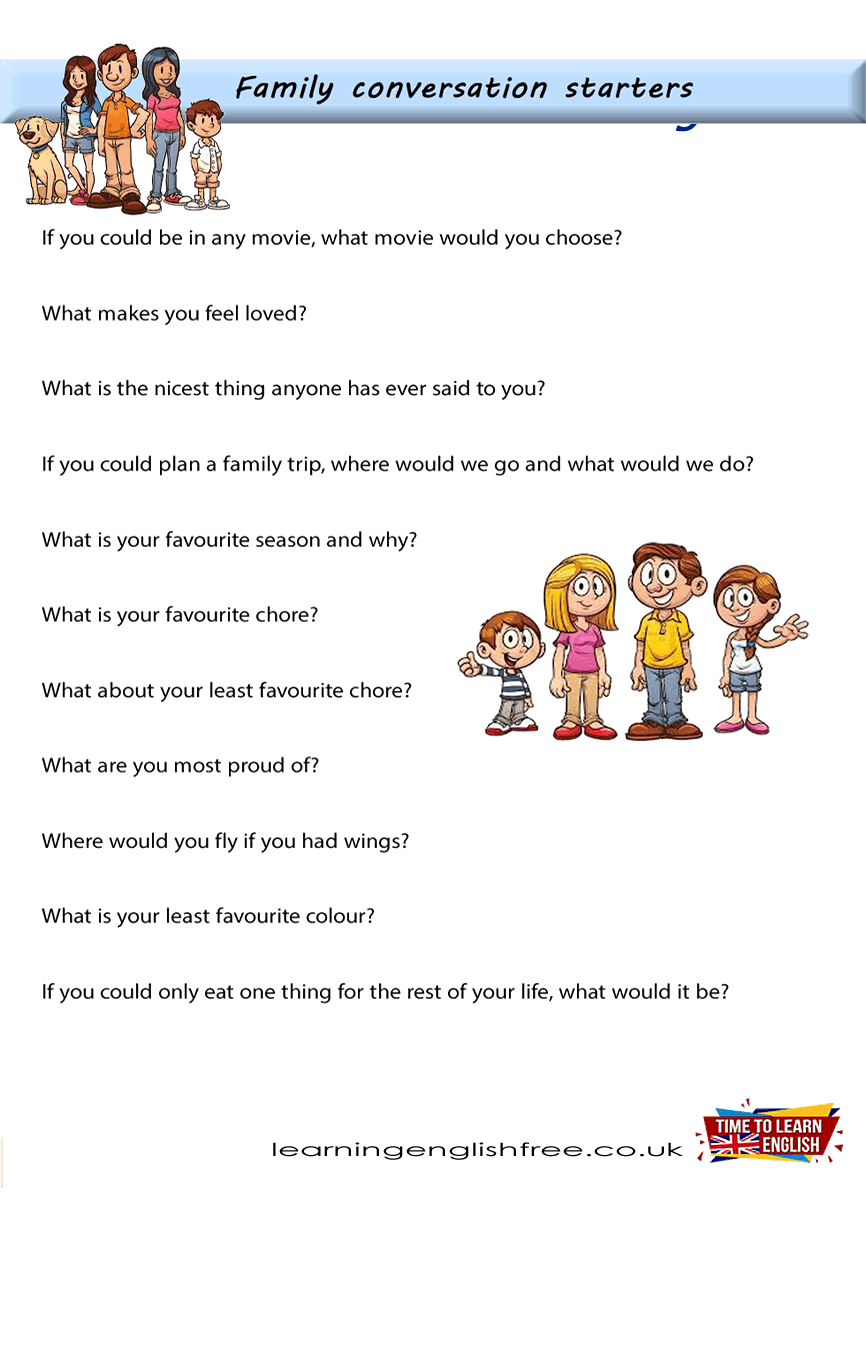
Introduction to Family Conversation Starters
Welcome to "Engaging Family Conversations: Sparking Meaningful Dialogue," a lesson designed to enhance your English communication within the family context. In this session, we focus on family conversation starters – questions that encourage dialogue and deepen connections among family members. These conversation starters are not only great for practising English, but they also help in understanding and expressing emotions, opinions, and ideas more clearly. Throughout this lesson, we'll explore different questions and learn how to use them effectively in conversations.
Learning Objectives:
- Learn key phrases to initiate family conversations.
- Understand how to respond to and engage with these conversation starters.
- Develop confidence in expressing thoughts and feelings in English.
Family Conversation Starters Explained
-
If you could be in any movie, what movie would you choose?
- Meaning: Asking about a favourite movie and reasons for choosing it.
- Example: "If I could be in any movie, I'd be in 'Harry Potter' because I've always wanted to explore Hogwarts."
-
What makes you feel loved?
- Meaning: Inquiring about actions or gestures that make one feel cherished.
- Example: "I feel loved when my family listens to me attentively."
-
What is the nicest thing anyone has ever said to you?
- Meaning: Sharing memorable compliments or kind words received.
- Example: "The nicest thing anyone has ever said to me was that I have a kind heart."
-
If you could plan a family trip, where would we go and what would we do?
- Meaning: Imagining a dream family holiday and activities.
- Example: "If I could plan a family trip, we would go to Italy and learn how to make pizza."
-
What is your favourite season and why?
- Meaning: Discussing personal preferences for different times of the year.
- Example: "My favourite season is summer because I love going to the beach."
-
What is your favourite chore?
- Meaning: Asking about a household task someone enjoys.
- Example: "My favourite chore is watering the plants; it's relaxing."
-
What about your least favourite chore?
- Meaning: Discussing a household task someone dislikes.
- Example: "My least favourite chore is washing dishes; it's just boring."
-
What are you most proud of?
- Meaning: Sharing personal achievements or proudest moments.
- Example: "I am most proud of winning the art competition at school."
-
Where would you fly if you had wings?
- Meaning: An imaginative question about flying to a desired destination.
- Example: "If I had wings, I would fly to New Zealand to see the beautiful landscapes."
-
What is your least favourite colour?
- Meaning: Asking about a disliked colour.
- Example: "My least favourite colour is orange; I just don't like how it looks."
-
If you could only eat one thing for the rest of your life, what would it be?
- Meaning: Discussing a favourite food that one could eat indefinitely.
- Example: "If I could eat only one thing forever, it would be sushi."
-
Family
- Meaning: Refers to a group of individuals related by blood, marriage, or other significant connections.
- Example: "Our family enjoys playing board games together on the weekends."
Conclusion and Summary
In this lesson, "Engaging Family Conversations: Sparking Meaningful Dialogue," we've explored a variety of conversation starters to foster engaging and meaningful discussions within families. By learning and using these questions, you gain not only a deeper understanding of family members but also improve your English communication skills.
Key Takeaways:
- Contextual Usage: Understanding how to use these conversation starters can lead to deeper family connections.
- Practice Regularly: Incorporate these questions into your daily conversations to improve fluency.
- Creative Memory Techniques: Use mind maps, drawings, or sticky notes to remember these questions.
- Apply in Real Life: Use these starters in actual family discussions to see their impact.
- Engage with Our Community: Share your experiences and practice your skills on our Facebook page at www.facebook.com/learningenglishfree.co.uk.
Remember, effective communication is key to maintaining strong family bonds. We encourage you to share these lessons and join our Facebook community for more insights and tips.
